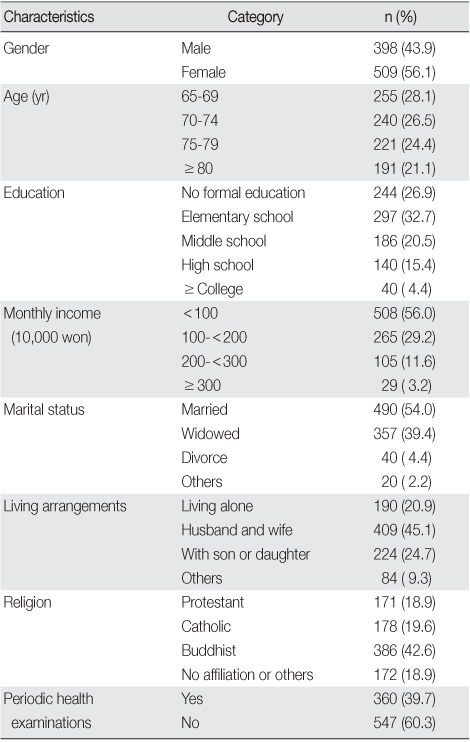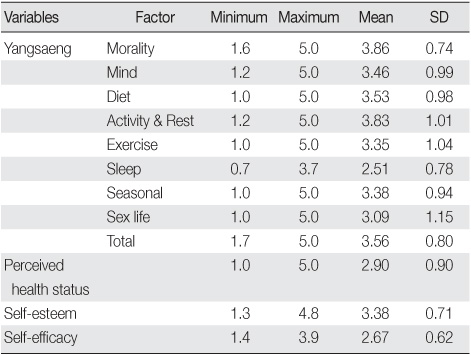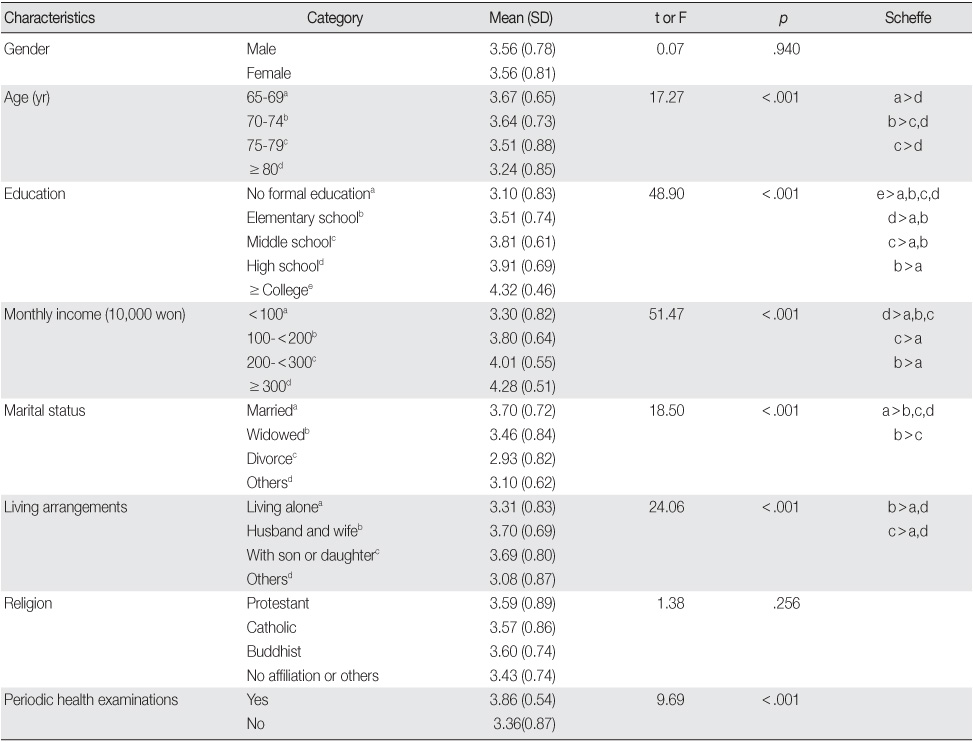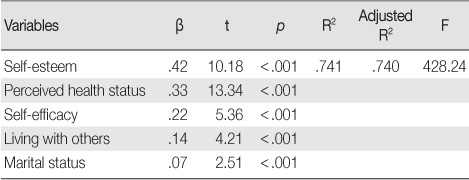Articles
- Page Path
- HOME > J Korean Acad Nurs > Volume 41(1); 2011 > Article
-
Original Article
- Factors Influencing Yangsaeng in Elders (Yangsaeng; Traditional Oriental Health Promotion)
- Yeong Sook Park, Duk Sun Seo, Yunhee Kwon
-
Journal of Korean Academy of Nursing 2011;41(1):72-79.
DOI: https://doi.org/10.4040/jkan.2011.41.1.72
Published online: February 28, 2011
1Professor, College of Nursing, Keimyung University, Daegu, Korea.
2Director, Donga Medi Hospital, Daegu, Korea.
3Professor, Department of Nursing, Taegu Science University, Daegu, Korea.
- Address reprint requests to: Kwon, Yunhee. Department of Nursing, Taegu Science University, 390 Taejeon-dong, Buk-gu, Daegu 702-723, Korea. Tel: +82-53-320-1056, Fax: +82-53-320-1761, sengbira@hanmail.net
• Received: June 28, 2010 • Accepted: February 25, 2011
© 2011 Korean Society of Nursing Science
Abstract
-
Purpose
- The study was done to identify factors influencing Yangsaeng in elders.
-
Methods
- Data were collected by questionnaires from 907 elders in D metropolitan city. Measures were Yangsaeng, perceived health status, self-efficacy, and self esteem. Data were analyzed using frequencies, means and standard deviation, t-test, one-way ANOVA, Pearson correlation coefficients, and stepwise multiple regression with SPSS/WIN 13.0 version.
-
Results
- The mean score for Yangsaeng the participants was 3.56, out of a possible 5. There were significant differences in Yangsaeng according to age, education level, monthly income, marital status, family structure, and periodic health examination. Yangsaeng correlated positively with perceived health status, self-efficacy and self-esteem. According to the research, factors influencing Yangseng in elders were self-esteem, perceived health status, self-efficacy, family structure, and marital status.
-
Conclusion
- The positive correlation between Yangsaeng and health promotion behavior and perceived health status, self-efficacy, and self-esteem identified in this study can have an impact on strategies to improve the health of Korean elders. Therefore, the results can be used as a reference for future studies.
- 1. An HG, Shin YH, Gu BS. A study of Gigong-yangsaeng (Good life) and the old-health care. Journal of Oriental Neuropsychiatry. 2000;11:177–187.
- 2. Choi EK. Relationship between actual health and Yangseng of the elderly in urbanites. 2004;Iksan, Wonkwang University. Unpublished master's thesis.
- 3. Choi IH. A study on self-efficacy, family support and health promoting behavior of the aged in a community. Journal of Korean Community Nursing. 2003;14:576–585.
- 4. Hang MH. Structural model for self care and well-being of elderly. 2000;Daegu, Kyungpook National University. Unpublished doctoral dissertation.
- 5. Jeon BC. Self-esteem: A test of it's measurability. Yonsei Nonchong. 1974;11:107–129.
- 6. Jeon EY, Suh BD. Factors influencing health promotion behavior in elderly people living at home. Journal of Korean Gerontological Nursing. 2004;6:38–46.
- 7. Jung HY, Park HS, Park SY. A study on Yangsaeng for health promotion of aged women in rural area. Journal of Korean Academy of Community Health Nursing. 2009;20:49–58.
- 8. Kim AJ. Development of a tool in measuring Yangsaeng. 2004;Seoul, Ewha Womans University. Unpublished doctoral dissertation.
- 9. Kim SY. A study of factors influencing health promotion behavior in elderly people: Self efficacy, social support and depression. Journal of Korean Gerontological Nursing. 2003;5:171–181.
- 10. Korea social index. National Statistic Organization Office. 2009;Retrieved September 2, 2009. from http://www.kosis.kr/html/Interstatic/research/do02.jsp?vwcd=MT_CTITLE&listed=MT_CTITLE_E.
- 11. Oh HS. Health promoting behaviors and quality of life of Koreanwomen with arthritis. The Journal of Nurses Academic Society. 1993;23:617–630.ArticlePDF
- 12. Park SO, Back HJ, Kim CM, Moon JH, Choi SY, Kim JS, et al. A study on self-esteem and social support, health-promoting lifestyle of the elderly. Journal of Korean Community Nursing. 2003;14:144–156.
- 13. Pender NJ. Health promotion and nursing. 1996;3rd ed. Norwalk, CT, Appletion & Lange.
- 14. Pender NJ. Health promotion and nursing. Paper presented at The First International Conference of College of Nursing, Korea University. 1999;10;Seoul, Korea.
- 15. Pender NJ, Pender AR. Attitudes, subjective norms, and intention to engage in health behaviors. Nursing Research. 1986;35:15–18.PubMed
- 16. Rosenberg M. Society and adolescent self-image. 1965;Princeton, NJ, Princeton University Press.
- 17. Sarkisian CA, Prohaska TR, Wong MD, Hirsch S, Mangione CM. The relationship between expectations for aging and physical activity among older adults. Journal of General Internal Medicine. 2005;20:911–915.ArticlePubMedPMC
- 18. Seo HM. Construction of health promoting behaviors model in elderly. 2001;Seoul, Seoul National University. Unpublished doctoral dissertation.
- 19. Sherere M, Maddux JE. The self-efficacy scale: Construction & validity. Psychological Reports. 1982;51:663–667.
- 20. Shin YS, Kim EH. A study on health behaviors, health status and anxiety about aging for the elderly. Journal of Korean Academy of Community Health Nursing. 2009;20:179–188.
- 21. Sohn SY. Relation of rural elderly people's self-esteem and social support to their quality of life. Journal of Korean Academy of Community Health Nursing. 2006;17:176–185.
- 22. Speake DL, Cowart ME, Pellet K. Health perceptions and lifestyle of the elderly. Research in Nursing and Health. 1989;12:93–100.PubMed
- 23. Sung JS, Park CS. Health promoting behavior and health status in the elderly. Journal of Korean Gerontological Nursing. 2005;7:71–78.
- 24. Walker SN, Sechrist KR, Pender NJ. The health-promoting life style profile: Development and psychometric characteristics. Nursing Research. 1987;36:76–81.PubMed
- 25. Wang MJ, Cho SJ, Cho YH, Park IH, Kho JE, Choi HJ, et al. Community nursing. 2010;Seoul, Hyunmoon publishing Co..
REFERENCES
Figure & Data
REFERENCES
Citations
Citations to this article as recorded by 

- A Concept Analysis of Yangsaeng (Nurturing Life) Using Rogers’ Evolutionary Method
Youngmi Kang, Minkyung Gu
Holistic Nursing Practice.2025; 39(6): 346. CrossRef - A Conceptual Analysis of Korean Elders' Yangsaeng in Nursing
Min Kyung Gu
Journal of Korean Academy of Community Health Nursing.2019; 30(1): 1. CrossRef - Predictors of Yangsaeng (Health Management) Among Korean Middle-Aged Adults
Min Kyung Gu, Sohyune R. Sok
Holistic Nursing Practice.2018; 32(4): 210. CrossRef - A Trend Analysis of the Journal of Korean Nursing Research related with Yangseng
Yunyoung Kim, Hye-Ju Park, Eunsu Jang
Journal of East-West Nursing Research.2016; 22(1): 10. CrossRef - Traditional Yangsaeng oriental health promotion in patients with cardiovascular disease
S. Shin, J.H. Kim, D. Jung
International Nursing Review.2015; 62(3): 312. CrossRef - Influence of Frailty, Nutritional Status, Positive Thinking and Family Function on Health Conservation of the Elderly at Home
Hae Kyung Chang
Korean Journal of Adult Nursing.2015; 27(1): 52. CrossRef - Factors Influencing Yangsaeng in Middle aged women
Su-Jeong Yi, Ae-Kyung Kim
Journal of Korean Academy of Fundamentals of Nursing.2014; 21(1): 39. CrossRef - A Study on Daily Living Abilities, Self-efficacy and Yangsaeng Behavior in Elderly Men (Yangsaeng; traditional oriental health promotion)
Oh-Gye Kwag, Yunhee Kwon
Journal of Korean Academy of Community Health Nursing.2013; 24(1): 11. CrossRef - General Characteristics, Antherpometric Values and Health-Related Factors according to Sasang Constitution among Elderly People in Rural Areas
Kyung-Mi Yang
Journal of the Korean Home Economics Association.2012; 50(2): 39. CrossRef - Concept Analysis of Health Equilibrium in the Community-dwelling Elderly With Chronic Diseases
Jeong Soo Kim
Journal of Korean Public Health Nursing.2012; 26(3): 428. CrossRef - Validation of a Path Model on Elderly Women's Yangsaeng (Yangsaeng; traditional oriental health promotion)
Yeong Sook Park, Hwa Yean Lee, Yunhee Kwon
Journal of Korean Academy of Community Health Nursing.2011; 22(3): 325. CrossRef
Factors Influencing Yangsaeng in Elders (Yangsaeng; Traditional Oriental Health Promotion)
Factors Influencing Yangsaeng in Elders (Yangsaeng; Traditional Oriental Health Promotion)
General Characteristics of Participants (N=907)
Scores for Yangsaeng, Perceived Health Status, Self-Efficacy and Self-Esteem (N=907)
Scores for Yangsaeng According to General Characteristics (N=907)
Correlation of Yangsaeng, Perceived Health Status, Self-Esteem and Self-Efficacy Level (N=907)
Factors Related to Yangsaeng (N=907)
Table 1
General Characteristics of Participants (N=907)
Table 2
Scores for Yangsaeng, Perceived Health Status, Self-Efficacy and Self-Esteem (N=907)
Table 3
Scores for Yangsaeng According to General Characteristics (N=907)
Table 4
Correlation of Yangsaeng, Perceived Health Status, Self-Esteem and Self-Efficacy Level (N=907)
Table 5
Factors Related to Yangsaeng (N=907)
 KSNS
KSNS
 E-SUBMISSION
E-SUBMISSION





 Cite
Cite

